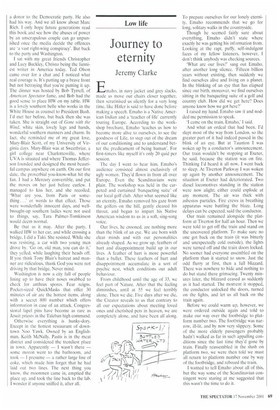Low life
Journey to eternity
Jeremy Clarke
Emaho, in navy jacket and grey slacks, made us move our chairs closer together, then scrutinised us silently for a very long time, like Hitler is said to have done before making a speech. Emaho is a Native American Indian and a 'teacher of life' currently touring Europe. According to the workshop brochure, Emaho 'teaches us how to become more alive to ourselves, to see the goodness of Life, to step out of the dream of our conditioning and to understand better the predicament of being human'. For first-timers like myself it's only 20 quid per session.
The day I went to hear him, Ernaho's audience consisted almost exclusively of ugly women. They'd flown in from all over Europe. Even the Scandinavians were plain. The workshop was held in the carpeted and curtained 'banqueting suite' of our local golf club. After what seemed like an eternity, Emaho removed his gaze from the golfers on the hill, gently cleared his throat, and began to impart his Native American wisdom to us in a soft, sing-song voice, Our lives, he crooned, are nothing more than the blink of an eye. We are born with clear minds and with our personalities already shaped. As we grow up, feathers of hurt and disappointment build up in our lives. A feather of hurt is more powerful than a bullet. These feathers of hurt and disappointment accumulate in a sort of psychic nest, which conditions our adult behaviour.
From childhood until the age of 33, we feel part of Nature, After that the feeling diminishes, until at 55 we feel terribly alone. Then we die. Five days after we die, the Creator reveals to us that contrary to all our expectations about meeting loved ones and cherished pets in heaven, we are completely alone, and have been all along. To prepare ourselves for our lonely eternity, Emaho recommends that we go for long, solitary walks in the countryside.
Though he seemed fairly sure about everything, Emaho didn't state where exactly he was getting his information from. Looking at the rapt, puffy, self-indulgent faces of my fellow listeners, however, I don't think anybody was checking sources.
'What are our lives?' sang out Emaho, after another long silence. 'Fifteen billion years without existing, then suddenly we find ourselves alive and living on a planet. In the blinking of an eye that has elapsed since our birth, moreover, we find ourselves sitting in the banqueting suite of a golf and country club. How did we get here? Does anyone know how we got here?'
I raised my hand. Emaho saw it and nodded me permission to speak.
'I came on the train, Emaho,' I said.
And what an ordeal that had been. I'd slept most of the way from London, so the greater part of it had indeed passed in the blink of an eye. But at Taunton I was woken up by a conductor's announcement. Our train wouldn't be stopping at Exeter, he said, because the station was on fire. Thinking I'd heard it all now, I went back to sleep. At Tiverton Parkway I was woken up again by another announcement. The situation at Exeter had deteriorated. Two diesel locomotives standing in the station were now alight; either could explode at any moment. The air was thick with asbestos particles. Fire crews in breathing apparatus were battling the blaze. Long delays can be expected, said the conductor.
Our train remained alongside the platform at Tiverton for half an hour. Then we were told to get off the train and stand on the uncovered platform. To make sure no one got back on the train (it was bitterly and unexpectedly cold outside), the lights were turned off and the train doors locked. No sooner had everyone assembled on the platform than it started to snow. Just the odd flurry at first, then a full blizzard. There was nowhere to hide and nothing to do but stand there grimacing. Twenty minutes later, the blizzard ceased as suddenly as it had started. The moment it stopped, the conductor unlocked the doors, turned on the lights, and let us all back on the train again.
Before we could warm up, however, we were ordered outside again and told to make our way over the footbridge to platform number two, The footbridge was nar row, and by now very slippery. Some of the more elderly passengers probably hadn't walked as far in such appalling conditions since the last time they'd gone by train. Finally reassembled in the slush on platform two, we were then told we must all return to platform number one by way of the footbridge, and reboard the train.
I wanted to tell Emaho about all of this, but the way some of the Scandinavian contingent were staring at me suggested that this wasn't the time to do it.






















































































 Previous page
Previous page